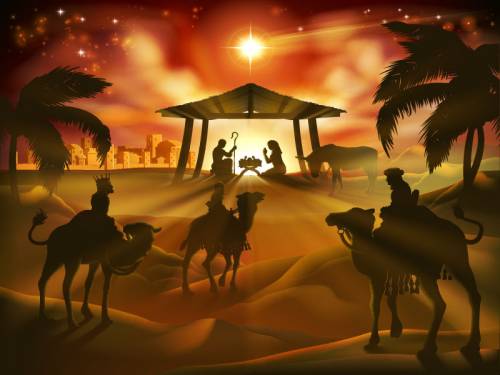WHAT PRESBYTERIANS BELIEVE
Seeing Christ leads to giving more of ourselves
by Michelle Bartel | Presbyterians Today
 The medieval church in the 4th century set Dec. 25 as Christmas Day to celebrate the birth of Jesus Christ. In the years that followed, the church expanded the celebration of Christmas to a 12-day festival, running from Dec. 25 to Jan. 6, the observance of Epiphany. For Presbyterians, Epiphany is key to our discipleship of Jesus in the world God so loves.
The medieval church in the 4th century set Dec. 25 as Christmas Day to celebrate the birth of Jesus Christ. In the years that followed, the church expanded the celebration of Christmas to a 12-day festival, running from Dec. 25 to Jan. 6, the observance of Epiphany. For Presbyterians, Epiphany is key to our discipleship of Jesus in the world God so loves.
The event of the Epiphany in the Gospel of Matthew (2:1–12) refers to God’s self-revelation in the baby Jesus, recognized by the Magi after their journey from the East. The star they followed led them to Jesus, King of the Jews, revealed as their Savior — indeed, the Savior of all people. When the Magi saw Jesus with Mary, they were overwhelmed with joy. Who wouldn’t be after a long journey for promised salvation?
These days, we celebrate Epiphany because it reminds us of who we are called to be as followers of Jesus. We are formed as people who see, recognize and point to God’s saving presence in this world. We strive to give ourselves and our lives to God in joy, just as the Magi did. The celebration of Epiphany also gives us an opportunity to consider what it means to live out the difference the birth of Jesus makes for us and the world.
But are we fully celebrating Epiphany if we don’t ponder — and live out — the complete reorientation of our lives to Jesus? Have we really been changed by the Christ Child — reorienting our words and deeds — if we pay no attention to imprisoned migrant children at our southern border?
We know from the Bible that unless we seek justice for all people, especially the vulnerable, our worship is meaningless to God. We read in James 1:27 that “religion that is pure and undefiled before God, the Father, is this: to care for orphans and widows in their distress, and to keep oneself unstained by the world.”
We see even in their return home, the Magi are guided by God, away from Herod’s worship of power. Where we invest our worship, we invest our lives. And where we invest our lives, we invest our journeys.
We see in the Magi, too, a reflection of our longing to see the God in whom we believe. As the Magi understood, Jesus is the savior of all. This includes our sibling children of God who are immigrants, widows, orphans and the poor, as we read over and over again in the Scriptures. This is at the heart of our Presbyterian faith. So how will we join the Magi this year?
Our worship celebrations of Epiphany might include acting out the readings of the day, especially the story of the Magi. There might be hymn sings or Sunday feasts or dropping slips of paper in the offering plates or baskets, describing what we will offer to God with our lives. Gathered in homes, friends and families might open presents on Epiphany, Jan. 6.
The star the Magi followed reveals the light that shines for all people. No matter how your worshiping community marks Epiphany — and maybe it doesn’t — you can mark it for yourself as a disciple of Jesus. You might light a candle and read Matthew 2:1–12 and imagine that these Magi are your siblings in Christ and that you are on the long, hard journey with them. Together you are overwhelmed with joy because you see that the King of the Jews, the Savior of all people, has been born into the world. You might spend time in prayer for all those in God’s world who long for that healing and salvation: refugees, victims and survivors of violence, and those who have been starved by drought.
When that joy of seeing Christ, and wanting to share Christ with others, leads to the question “What can I give?” we will then find that actions that communicate God’s healing to others become a part of our life. And then, the whole world can see the star, follow it to Jesus and be overwhelmed with joy at finally seeing God’s salvation.
Michelle Bartel is the transitional pastor and head of staff at First Presbyterian Church of Lebanon, Indiana.
Support Presbyterian Today’s publishing ministry. Click to give
![]() You may freely reuse and distribute this article in its entirety for non-commercial purposes in any medium. Please include author attribution, photography credits, and a link to the original article. This work is licensed under a Creative Commons Attribution-NonCommercial-NoDeratives 4.0 International License.
You may freely reuse and distribute this article in its entirety for non-commercial purposes in any medium. Please include author attribution, photography credits, and a link to the original article. This work is licensed under a Creative Commons Attribution-NonCommercial-NoDeratives 4.0 International License.
Categories: Presbyterians Today
Tags: children, Christ child, Epiphany, Jesus, justice, magi, manifestation, migrants, self-revelation
Ministries: Presbyterians Today